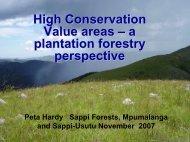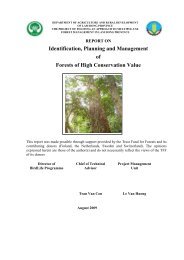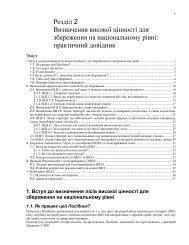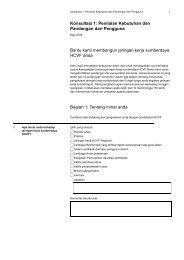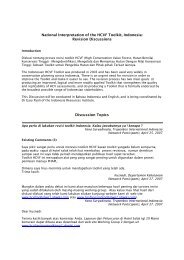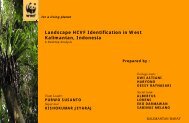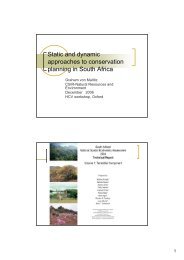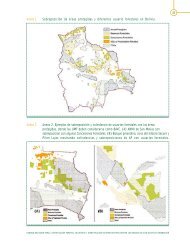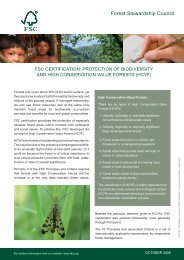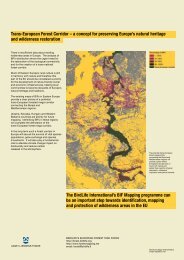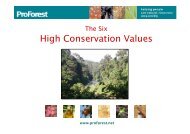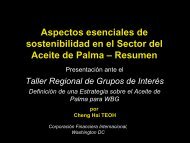FSC reflected in scientific and professional literature
FSC reflected in scientific and professional literature
FSC reflected in scientific and professional literature
You also want an ePaper? Increase the reach of your titles
YUMPU automatically turns print PDFs into web optimized ePapers that Google loves.
3. Impact on forest policy: 3.3 Governments <strong>and</strong> policy development<br />
A new culture of multi-stakeholder processes<br />
“One of certification’s most relevant contributions to positive policy developments has<br />
been the <strong>in</strong>troduction of a new culture of multi-stakeholder processes that is characterized<br />
by an <strong>in</strong>creased awareness of SFM. New forms of dialogue have emerged where forestry<br />
issues are addressed at local, national, <strong>and</strong> even regional levels improv<strong>in</strong>g the transparency<br />
of forest practice, the underst<strong>and</strong><strong>in</strong>g of what should be deemed good forestry <strong>and</strong><br />
the appropriate role of different groups <strong>in</strong> the process. This <strong>in</strong>fluence seems to have<br />
derived more from the outcomes related to the participatory processes for develop<strong>in</strong>g SFM<br />
st<strong>and</strong>ards, than from the cumulative biophysical or sectoral impacts of <strong>in</strong>dividual<br />
certificates.” (Rametste<strong>in</strong>er 2000) 368<br />
Creation of <strong>in</strong>ter-sectoral dialogues <strong>in</strong> Russia<br />
Hirschberger’s study (2005) of certification reports from 12 Russian forest companies says <strong>in</strong><br />
the summary:<br />
“Another important improvement, which cannot be shown by an analysis of the CARs, is<br />
the creation of an <strong>in</strong>ter-sectoral dialogue between environmental NGOs, bus<strong>in</strong>ess representatives<br />
<strong>and</strong> adm<strong>in</strong>istration.” 369<br />
Measures to foster certification<br />
L<strong>in</strong>coln Quevedo (2006) 370 <strong>and</strong> other authors report that governments <strong>in</strong> some countries actually<br />
reduc<strong>in</strong>g regulatory requirements for certified operations, which partly <strong>in</strong>clude tax <strong>in</strong>centives<br />
for the forest management with <strong>FSC</strong> certification:<br />
368 Rametste<strong>in</strong>er, Ewald (2000): The role of governments <strong>in</strong> SFM-certification. In: Diskussionspapiere - Institut fuer<br />
Sozioökonomik der Forst- und Holzwirtschaft (Austria).<br />
369 Hirschberger, Peter (2005): The Effects of <strong>FSC</strong>-certification <strong>in</strong> Russia: an analysis of CARs. WWF Forest Programme.<br />
25 p. http://www.p<strong>and</strong>a.org/downloads/forests/fscanalysisrussia.pdf (as of June 2008)<br />
370 Quevedo, L<strong>in</strong>coln (2006): Forest Certification <strong>in</strong> Bolivia. In: Cashore, B.; Gale, F.; Meid<strong>in</strong>ger, E.; Newsom, D.<br />
(2006): Confront<strong>in</strong>g Susta<strong>in</strong>ability: Forest Certification <strong>in</strong> develop<strong>in</strong>g <strong>and</strong> transition<strong>in</strong>g countries. In: Environment.<br />
181 of 245<br />
® <strong>FSC</strong>, A.C. All rights reserved. <strong>FSC</strong>-SECR-0002



